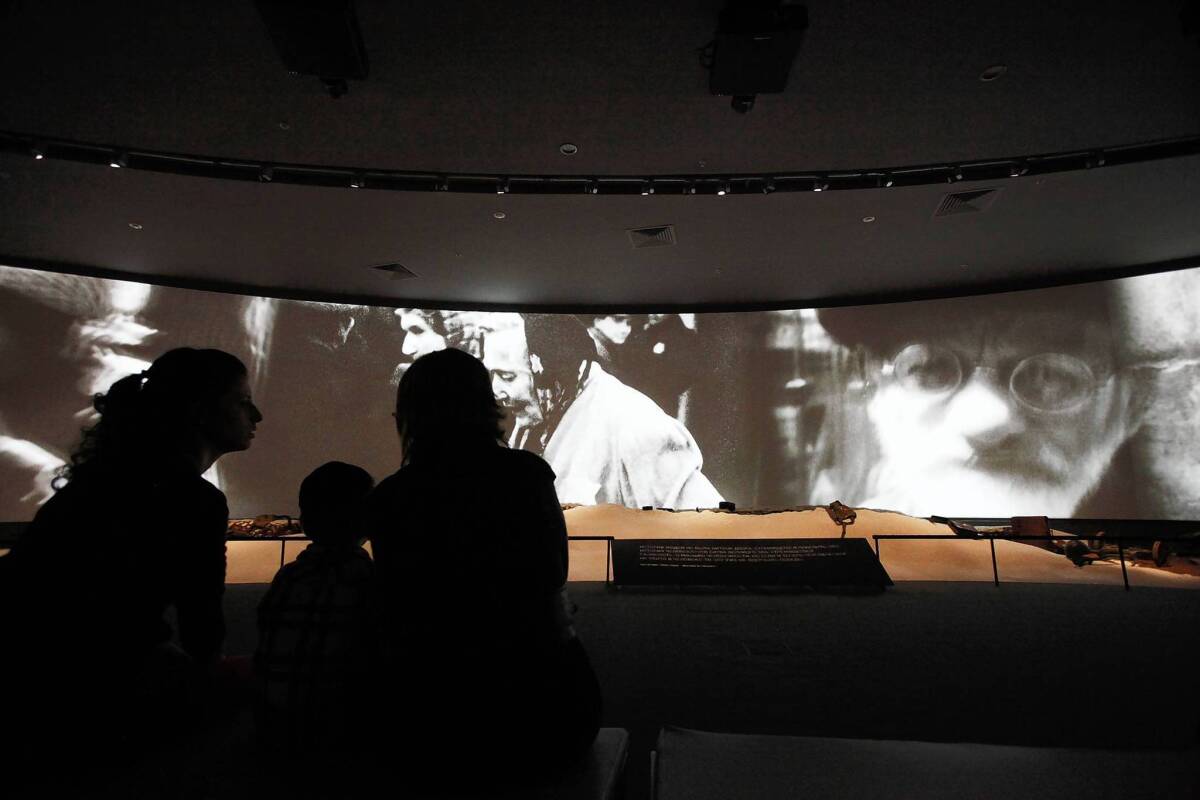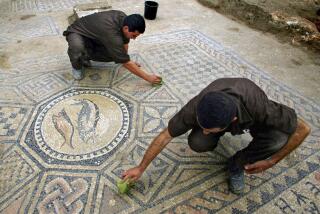Russian Jewish museum opens in Moscow

MOSCOW — Unique not only in its high-tech content but also in its political importance, a museum of Jewish history and culture opened to the public Sunday in Moscow, the capital of a nation beset by anti-Semitism for more than two centuries.
Several hundred visitors filed into the more than 90,000-square-foot former bus garage and found themselves immersed in a lesson in tolerance.
“The opening of such a museum in Moscow is a qualitatively new stage of Jewish life in Russia,” said Alexander Boroda, president of the Federation of Jewish Communities in Russia.
PHOTOS: Jewish museum in Moscow
The $50-milllion museum, which took four years to construct, would have been unthinkable even three decades ago, before the period of perestroika under Mikhail Gorbachev and the disintegration of the Soviet Union.
But not all is settled. Turmoil over the increasingly autocratic rule of Vladimir Putin has given rise to worries about a possible new strain of racism-fueled Russian nationalism. A week ago, thousands of nationalists, many in black hoods and high boots, marched in the streets of Moscow, denouncing Jews, Masons and other ethnic, religious and social groups.
Putin congratulated visiting Israeli President Shimon Peres on the official inauguration of the Jewish Museum and Center of Tolerance last week, saying, “It is yet another of our joint contributions to the struggle against xenophobia, to the struggle against nationalism.”
The museum, founded by the Jewish federation and funded in part by private donors, looks back at a history of struggle and achievements despite horrendous episodes of religious violence.
A visit begins with a 15-minute 4-D film about the early history of Judaism. Seats shake under the audience as the narrator describes the biblical plagues of Egypt, such as the rain of frogs.
Russia’s Jewish population sprang from the division of Poland at the end of the 18th century among Russia, Prussia and Austria, the exhibit rooms show. At that time, Russia inherited about 1 million Jews, many of whom lived in shtetls under the burden of dozens of czarist decrees.
Things worsened during the bloody pogroms of the early 20th century and the violence of the Bolshevik Revolution, which at the same time officially granted equal rights to all groups, including Jews.
The museum outlines the contributions of Jewish politicians, engineers, artists, writers and poets in the development of the Soviet state, industry and culture.
World War II brought the horrors of the Holocaust, in which more than 2.5 million Russian Jews perished, and afterward, the continuing anti-Semitism that prompted a mass exodus of Jews during the Leonid Brezhnev era.
The museum’s final rooms express hope for a revival of Jewish life in Russia and the return of many emigrants.
“We tried to make our museum not about how bad or how good it was to be a Jew in Russia, but simply about how it was,” said Borukh Gorin, a spokesman for the Jewish federation, as he rubbed the surface of a market barrel standing in the middle of the shtetl section. The move set off a slide show of period photographs.
Nearby, two visitors donned earphones to listen to the story of Leon Trotsky, the Jewish Bolshevik leader who was eventually assassinated in exile in Mexico.
An elderly man couldn’t hold back his tears as he watched a Holocaust documentary. Nearby, a group walked past a copy of a T-34 tank, the main Russian army tank of World War II, produced in the Urals town of Nizhny Tagil in a plant run by a Jewish man. There was also a reproduction of a plane flown during the war by the only Jewish female pilot, who received the Hero of the Soviet Union award.
Elsewhere, a group of young people stood laughing at a Jewish family scene from Soviet times, featuring two young characters telling jokes depicting the Russian Jewish sense of humor.
“Today we are happy to see how this utopia, this fantasy and dream, comes to life like a miracle in front of our very eyes,” Berel Lazar, chief rabbi of Russia, said in an interview. “Jews in Russia today feel more comfortable than ever before, and as this museum demonstrates, they can even add to the understanding in the country of how we could bring all different nationalities together to live in harmony.”
Many visitors left the museum Sunday saying they felt shaken and awed.
“I didn’t expect to see such a phenomenally grandiose thing as I saw here today,” said Anna Goldman, a 27-year-old art manager. “There are many Jewish centers and synagogues in Russia, but there was not a place to bring people of other nationalities to tell them what it really is to be a Russian Jew.”
More to Read
Sign up for Essential California
The most important California stories and recommendations in your inbox every morning.
You may occasionally receive promotional content from the Los Angeles Times.










